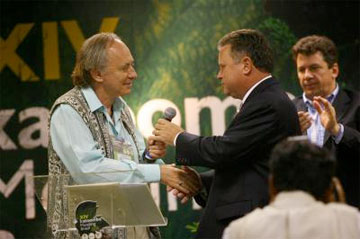Meeting at the Katoomba payments-for-ecosystem-services conference in Cuiaba, Brazil, Carlos Minc, Brazil’s Environment Minister, and Blairo Maggi, Governor of the State of Mato Grosso and the world’s largest individual soy grower, put aside their ideological differences and agreed to grant a temporary reprieve for ranchers and farmers in the Amazonian state, allowing them up to four years to reforest their holdings to bring them up to legal code. Under Brazilian law landowners in the “legal Amazon” are required to maintain 80 percent forest cover on their holdings, but in practice, the regulation is widely ignored.

Adversaries Carlos Minc and Blairo Maggi put aside their differences to sign an agreement at the Katoomba meeting in Cuiaba, Brazil. Image courtesy of Katoomba. |
Under the agreement, landowners will have one year to provide details of ownership of their holdings and submit a map showing cleared and degraded areas. They will then have one to three years, depending on the size of their property, to begin reforestation. Landowners will not be subject to fines for past deforestation provided they commit to reforestation. If landowners are unable or unwilling to reforest their lands they can “offset” deforestation by paying for reforestation in nearby watersheds.
“The goal is not to punish but to prevent destruction of the biome,” said Minc, who has publicly clashed with Maggi over deforestation during his first 10 months as Environment Minister. “Mato Grosso will be an example for other states.”
Minc added that landowners who refused to participate and continue to be in violation of the legal reserve law would “experience the heavy hand of Police, Army, Ibama and the environmental crimes law.”
Minc believes up to 90 percent of the state’s 140,000 landowners would likely accept the deal, which applies to holdings established before February 2008.
Governor Maggi, one of Brazil’s most powerful politicians and a frequent target for environmentalists for his large soy holdings and support of agricultural expansion, said the deal was not a pardon. He added that agricultural growth could continue in the state without the need to clear additional forest through conversion of low-intensity pasture to other crops and intensifying cattle production. Mato Grosso has some 26 million head of cattle across 24 million hectares of pasture.

Ninety to 140 billion tons of carbon are stored in the vegetation of the Amazon rainforest. The biome is home to as much as one-third of the planet’s terrestrial species. |
Maggi also voiced support for emerging markets for ecosystem services — the theme of the two-day Katoomba conference put on by Forest Trends. Maggi was joined by Binho Marques (Governor of Acre), Ivo Cassol (Rondônia), Eduardo Braga (Amazonas), Ana Júlia Carepa (Pará), Ruben Costas (Department of Santa Cruz in Bolívia) and Ivan Vasquez (Department of Loreto in Peru). More than 1,000 people attended the meeting.
The governors of the Amazon states said they want to develop a consensus on REDD — a proposed mechanism for compensating tropical countries for reducing emissions from deforestation and degradation — to present at the next U.N. climate conference, meeting in Copenhagen in December.
Michael Jenkins, president of the Katoomba Group, said during opening remarks that the ecosystem services market (including payments for carbon, water and biodiversity) could be a path for Brazil to become a global superpower. In a later presentation, Marcus Frank, an analyst at McKinsey & Company – Brazil, estimated that Brazil could earn tens of billions of dollars per year from ecosystem services in coming decades, turning it into the “Saudi Arabia of biomass”.
Excellent writeup from the Katoomba Group’s Ecosystem Marketplace: Historic Agreement at Katoomba Meeting.







